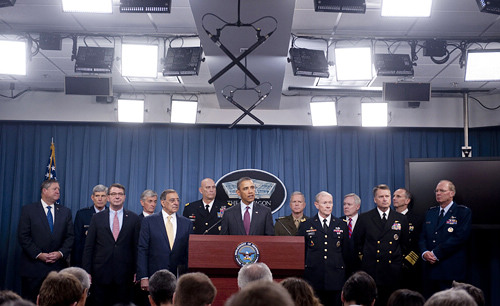|
 |
|
STRATEGIC SHIFT: U.S. President Barack Obama, flanked by military officials, speaks about a new defense strategic review during a press briefing at the Pentagon in Washington, D.C. on January 5. The review outlined U.S. defense budget priorities and the strategic shift toward Asia (XINHUAN/AFP) |
The United States has been shifting its strategic focus from the Middle East to Asia. Professor Clifford Kiracofe from the Virginia Military Institute and the Washington and Lee University, an expert on U.S. foreign policy and national strategy, recently spoke to Beijing Review reporter Ding Zhitao about the implications of the move and its influence on Sino-U.S. ties.
Beijing Review: You said foreign policy under the Barack Obama administration is a policy of confrontation and containment of China. So do you think the expanded U.S. presence in Asia is mainly targeting China? If so, what are the consequences in terms of diplomatic relations between the two countries?

Clifford Kiracofe: We've been in this region for a couple of hundred years, so our presence in Asia, or our so-called "return" to Asia is merely a reflection of our long-standing interest in Asia. My hope is that our policy in the region can be one that's more based on regional cooperation rather than any confrontational position that we might take, and thus our cooperation with China, Japan, Russia and other countries in the region.
My own personal view is one that advocates a policy of cooperation rather than confrontation or so-called "containment." And you have to realize that back home in the United States there is a lot of loose discussion about the so-called "China threat" or so-called rise of China. Some politicians and some strategists have tried to create policies to contain China. And I'm hopeful that in the future we can shift that mode into a more cooperative arrangement.
At the end of last year, the United States announced its reorientation of strategic priorities from Afghanistan and Iraq to Asia. What will this move bring to U.S. domestic and foreign policies? How will this shift of focus change the status quo in the Asia-Pacific region?
I think the present administration and the next administration, whichever may follow after 2012, have certainly got to engage the area more vigorously than in the past decade. We've been pinned down in Iraq and Afghanistan. The concept is to shift the attention toward Asia and where our economic interests are important. After 1975, our economic interests in Asia started to exceed our trade patterns with Europe. So that's a key point at which U.S. economic interests started to tilt toward Asia and away from Europe, just after President Richard Nixon's icebreaking visit to China. So really our economic relationship has been shifting more over the last 25 to 30 years or so to this area. It's only natural that we should shift our focus to the region.
On the foreign policy side, what's expected is a more vigorous diplomacy in the region, and also a more vigorous military presence. And this is what some people call a containment-style policy. In terms of our foreign policy, that would be the change toward a more aggressive diplomacy. And also diplomatic alignment with India, Japan and Australia could give the impression of an encirclement or containment diplomatic strategy. These would be the most significant elements in a new forward U.S. policy in the region.
| 